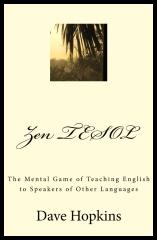
Summer 2013
Zen TESOL
Now
by Robb
Scott, Ed.D.
![]()
/Index/
/Letters/
/Profiles/
/Search/
/Podcasts/
![]()
Subscribe
for free!

Creating a Context for Dave Hopkins and Zen TESOL
Some of the most thought-provoking research in language learning pedagogy over the past 35 years has come from a sequence of ESL and cross-cultural gurus including, among others: Krashen and Terrell, Celce-Murcia and Larsen-Freeman, Candlin and Nunan, Azar, DiPietro, Widdowson, Prabhu, Fanselow, Richards, O'Neill, Crandall, Nieto, Reid, Canagarajah, Freeman, VanPatten, Kopriva, Kumaravadivelu, and a few others who have defined the major trends in distinctive ways influencing methodology, textbook publishing, and recent developments in the global industry which today is called international education.
At the heart of this industry is a confrontation between dominant post-world war II culture, as represented by British and American military and technological superiority, and the surging aspirations of many other cultures whose initial access to modern technology came through learning English as a gateway language, and whose first ESL/EFL teachers often served indirectly as faces of a marketing strategy to promote the economic success of Western businesses by instilling an affinity for our fashions and values.
Today the world is changing and ESL/EFL teaching, although continuing to be in great demand nearly anywhere you might put your thumb to stop a spinning globe, has undergone major transformations as well. One vivid example is the lack of interest in American or British culture as those paying the bills for English instruction insist on an evermore sanitized second language curriculum devoid of what are now considered irrelevant or irreverent aspects of "native English" social contexts. There are places in the world where ESL/EFL teachers are considered pretty much the equivalent of a mechanic or factory-line worker, as pay scales and prestige keep declining.
Yet even as the profession of international English language teaching has been undergoing drastic upheavals, and many of today's teachers find themselves under-appreciated when working abroad, there remains a great deal of respect for true cross-cultural leaders, especially those who have the integrity to respond intelligently to the challenges of change.
In a few weeks, one of these increasingly rare individuals will complete an extended term as a consultant for professional development at a major university in Saudi Arabia, and fly home to Thailand for a well-deserved period of rest and recreation with family, friends, and colleagues. David Hopkins has his feet firmly on the ground, and has stuck to his principles while working on international projects and teaching in overseas classrooms during a career which started in the 1960s at the old "Experiment in International Living" at the esteemed School for International Training (now called "World Learning, Inc.") in Brattleboro, Vermont.
I have found myself thinking about Dave this week because I was reading and listening (text to speech) on my Kindle to his classic text about lesson planning, "Zen TESOL."
I was lucky enough to be Dave's colleague when we were both teaching at the University of Nevada-Reno's intensive English program in Tokyo 25 years ago, and then he was my boss a year later at the Ohio Program for English Language Teaching (OPELT), an ESL/EFL curriculum and research team based inside Chubu University in Kasugai, near Nagoya, Japan. All those great conversations over miso soup at lunch time, and his instructive anecdotes from his teaching and living experiences all over the world (and our more recent discussions over cafe lattes in Riyadh) seem to have been distilled into this great book he wrote about what teachers ought to reflect on in planning and implementing their lessons.
I have been trying to pull a pithy quote from the book to give a flavor of what Dave Hopkins has accomplished, but I just do not believe any quote would do this text justice. You need to sit down with it, and read it as if you were engaged in a conversation yourself, comparing what you already do in your classes and your ideas about methodology with the ways Dave wants you to reconsider your assumptions, question your beliefs, and most of all, make sure you and your students are on the same page as far as a shared awareness of objectives and procedures is concerned.
When I traveled abroad to teach ESL/EFL for the first time in 1984, I carried with me Krashen and Terrell's "Natural Approach," Larsen-Freeman and Celce-Murcia's "The Grammar Book," and Betty Azar's "Understanding and Using English Grammar." If I were setting out today on a similar lifelong journey, I would just take with me "Zen TESOL" by Dave Hopkins. It is as thorough an explanation of the lesson planning and lesson teaching process as you will ever find. It's not by one of the gurus--it is by one of us, that colleague who makes you better just by sharing ideas in conversation.
This book will make you a better teacher, and help you become the kind of ESL/EFL professional whose status is based on practical knowledge, dependable work habits, and personal integrity. It just might help you weather the current global economic market and fluctuations in the field of international education.
2013 ESL MiniConference Online
PDF conversion by PDF Online
Article by Robb Scott, Ed.D.
DrRobbScott@gmail.com